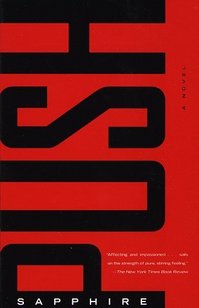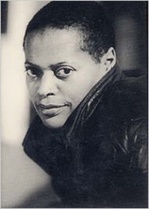Sapphire pushes for literacy: Author behind "Precious" speaking at U-M
At this point, I suspect that the buzz about the film “Precious” has reached even those who live under rocks. The story of 16-year-old Claireece Precious Jones, illiterate, HIV-positive, abused in every conceivable way by her mother and knocked up for the second time by her rapist father, is so viscerally gripping that even that bare litany of facts makes us contort our necks unnaturally as we try to simultaneously stare in horror and look away. And filmmaker Lee Daniels does a masterful job of letting us walk the line between the two, pulling together star power to get us into the seats and then unleashing us into a gritty, heartbreaking and sometimes just plain funny world once we get there. No wonder the word “Oscar” comes up in nearly every review.

Sapphire (who was born Ramona Lofton but said she changed her name because she just couldn’t picture “Ramona” on a book cover) finished “Push” (Vintage) in 1995 as she was exiting graduate school, and her advisor recommended that she look for a publisher. “By 1996,” she said by phone from the road, “the version that you’ve read was being published. And it just kind of took off — a book is like a child; you don’t know if it’s going to be a badass or sit in a corner all day. But this book had a life of its own.
"People were saying that because of the dialect (it’s narrated entirely in Precious’ voice and remains true to her lack of formal education), it would never be translated, but it’s been translated into 13 languages — not just the ones you would think of, but Korean, Hebrew, Greek… So people really took the novel to heart. Teachers would come up to me and say their kids loved my book. I know at one point they were using it at Hunter College of Social Work (in New York City) to show the students how they were perceived as social workers by their clients. It was also used at Harlem Hospital with psychiatric residents. So it had a lot of worlds — a sociological world in addition to the literary world.”

Sapphire
“And some of it is unbearable, even as it’s clinical. Even when they just write out the facts, there’s a part of you that knows this a human being, this is a 3-year-old sold into sexual slavery by her parents, and society’s going to have to deal with that for the rest of her life because she’s just a kid. So there’s a way that, in order to entertain that sort of information, you have to destroy the person and just look at the facts. But that’s how the process begins — that dehumanizing.
"So my job as the artist is to take those statistics — 40 percent of all women say they’ve been sexually abused, and that’s not just black women, that’s all women; 50 percent of African-American women are suffering from obesity and it’s something like 30 percent for white women — these are things that are in the culture already, and one job of an artist is to give them a voice. We’re one of the few industrialized nations who struggle with illiteracy — in some Scandinavian countries, they take care of that with everybody between the ages of 4 and 8. So even if you grow up to be a drug addict, you’ll be a drug addict who can read.”
It should come as no surprise to anyone who saw Precious’ strength unfold through conquering her illiteracy that Sapphire takes that issue seriously. She worked for 5 years in various capacities at after-school programs teaching kids to read and even now considers it to be one of the joys of her career.
“I’ve thought about this a lot,” she mused, “that our school system has all these kind of high-end people in the university who could interact with poor people who don’t make it into the university system. Every academic in (a university English) department should spend a year teaching literacy. How would our education departments be if a person who has the theory spent a year in Spanish Harlem, not as a consultant, but every day? I felt like the experience was invaluable to me,” she said, going on to talk about an “average-looking white male” who landed in her English 101 class on his fourth try at the credit.
Sensing that that kid wasn’t stupid and probably wasn’t repeating the class for fun, she drew on her experiences to ask if English was his second language and found that yes, his family was Italian and spoke no English at home. So she worked with him on basic composition rather than having him struggle to analyze “Paradise Lost” again, reassuring him that “‘This’ll be the last time you take 101; hang with me and we’ll make it.’ But why,” she wanted to know, “didn’t his first teacher do that?”
When I asked if we might have a little preview of the talk she plans to give at the symposium, she told me that the organizers had asked the participants to address a quote by Shirley Chisholm, the first black woman elected to Congress in 1968 and the first to run for president in 1972: “I was, am, and always will be a catalyst for change.” Then, admitting that she hadn’t quite finished preparing her remarks, she asked me if I had any thoughts on the subject, causing an involuntary snort of laughter — a woman who’s gotten this Playstation Nation to take a hard look at abuse, poverty, obesity, incest, illiteracy, disability and single motherhood surely doesn’t need advice from a book reviewer on being a catalyst for change. But it did give me an opening to ask the question that had sat heavily in the bottom of my soul during the week or so I spent with Precious, the one that sprang up fully formed in the bare wake of my heartbreak for her: Now what? Now that we have seen this, as executive producer Oprah likes to say, we can’t pretend we didn’t. So now…what can we do?
“You know what I was really impressed with when I saw Al Gore’s movie?” asked Sapphire, referring to the former presidential candidate’s 2006 Oscar-winning documentary “An Inconvenient Truth.” “I have a very diverse group of friends, and the people who really, really have a lot of influence in the world, they walked out of there and immediately got to work on some things. And then of course there were those of us who don’t have any influence, so there’s that. But we all went bought new light bulbs, because we could all do that.
So some people will read ('Push') and have tremendous ability to change things, but there will be other people who will do smaller things. Like saying to their boss, 'Maybe we should give that kid another chance,' or deciding that instead of throwing their kids’ comic books in the trash, they’re going to give them to a literacy program. Or a middle-class woman can decide that that coat that looks tacky to her would be really great for a woman in the Dress for Success program. The fashionistas can really help! Maybe if you’re into Calvin Klein this year, you can take all your old Ralph Lauren and, instead of taking it to a consignment shop to get a few bucks out of it, donate it to a woman who’s trying to get a job. Maybe there are people getting ready to retire and join the RV nation who can take time to volunteer to teach literacy one day a week. There are these little things we can do; if we think about the big things, they’ll never happen. We’re not all Obama, OK? Most people don’t have that type of power. But we can begin to make small changes.”
You can hear Sapphire's talk on “Push, Literacy, Women, and African American Literature” at 2 p.m. on Monday, January 18 in the Michigan Union Ballroom as part of the University of Michigan's MLK Day symposium. Admission is free.
Leah DuMouchel is a free-lance writer who covers books for AnnArbor.com.

